Thursday 8 September 2016 12:30pm
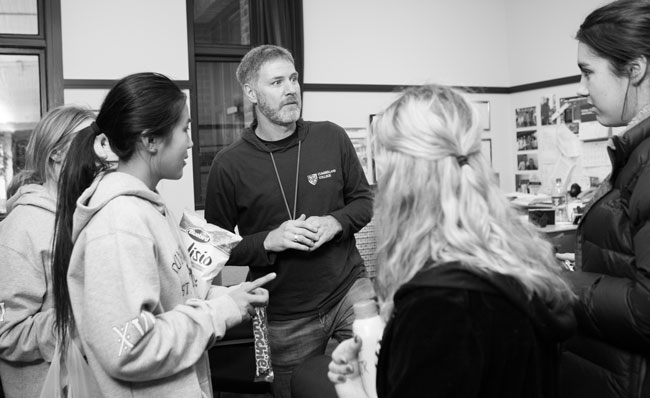
Nick Bates says that the reality of life in a residential community is that the interactions with residents make his role as Head of Cumberland College a lively one. Photos: Sharron Bennett.
Living in a residential college is an important part of the university experience for many students leaving home for the first time. At Otago, each of our 14 undergraduate residential colleges is supported by a team of individuals whose main priority is to ensure the welfare, enjoyment and overall success of the residents in their care.
At the helm of each college is a leader — known as a Warden at some colleges, Head of College or College Master at others — who is responsible for all aspects of the running and day-to-day management of the college, its residents, and staff.
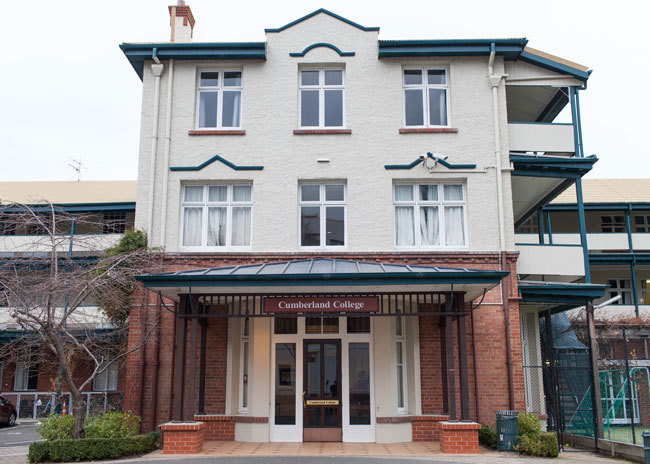
For over 25 years, Cumberland has been home to thousands of students but, for many decades before that, the building served as the Dunedin Hospital Nurses' Home.
Q. How long have you been with the college/University? How did you come to this role?
A. I started at Cumberland College in May 2013, so have been here for just over three years.
Q. What's your favourite college event each year and why?
A. That is a tough one, there's a lot happening. The Ball is always fun, Cumby's got Talent is a hit, and the Chocathon is very serious fun (a chocolate-themed event with lots of different competitions …. use your imagination).
However, on the other hand, I think the more meaningful events are when the students give back to the community, such as when the College does a Can Drive donating cans of food for a children's charity, the Relay for Life or the Shave for a Cure. This year the Shave saw 12 people in the college, including one brave girl with long hair, Emma Simcock Smith, not only do the shave, but raise over $1,800 for Leukaemia and Blood Cancer NZ. I really respect that effort, initiated and driven by a Residential Assistant (RA) and the residents. [Read the Otago Connection story]
All of the intercollege events are not only fun but really popular. I also love the inter-college rowing regatta, which is a highlight of the sports programme, but, equally, the college's instrumental concert was so enjoyable.
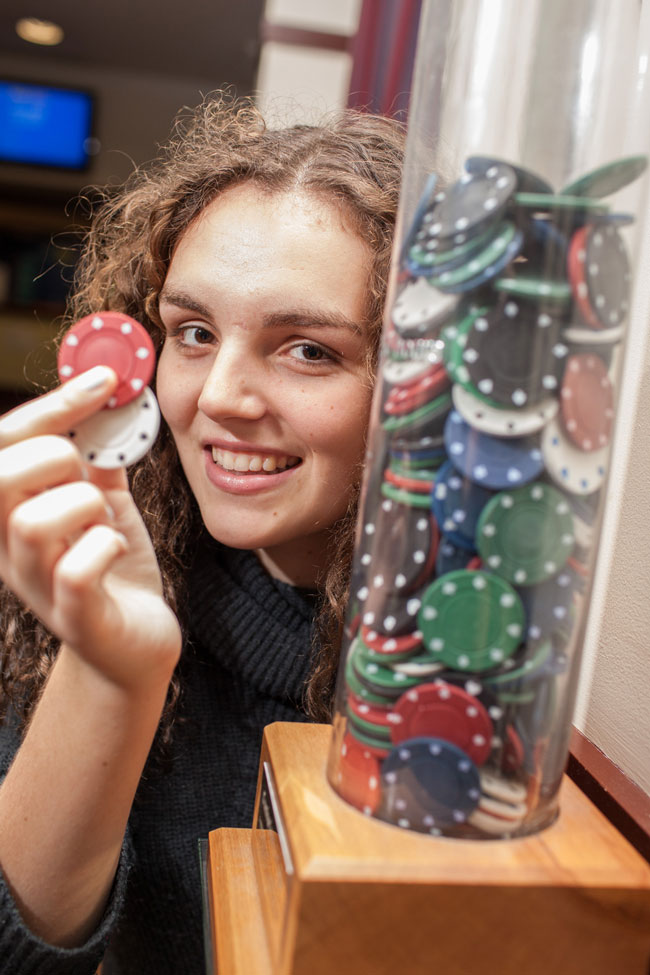
Cumberland students like Sophia Jordan keep track of the volunteer hours they put into community causes. Tokens representing their hours of effort fill a glass jar prominently displayed in the college's foyer. In 2014, for example, residents accumulated just over 700 volunteer hours.
Q. What's your favourite place/amenity within your college and why?
A. The dining room is my favourite place, simply because it's where so much community happens. Because we lack the indoor common spaces that some other colleges have, our dining room is not only a place where people gather to eat and catch up, but also to study, to play games, to share yarns, to enjoy Toast Time and just to relax. It's a community hub and I like that.
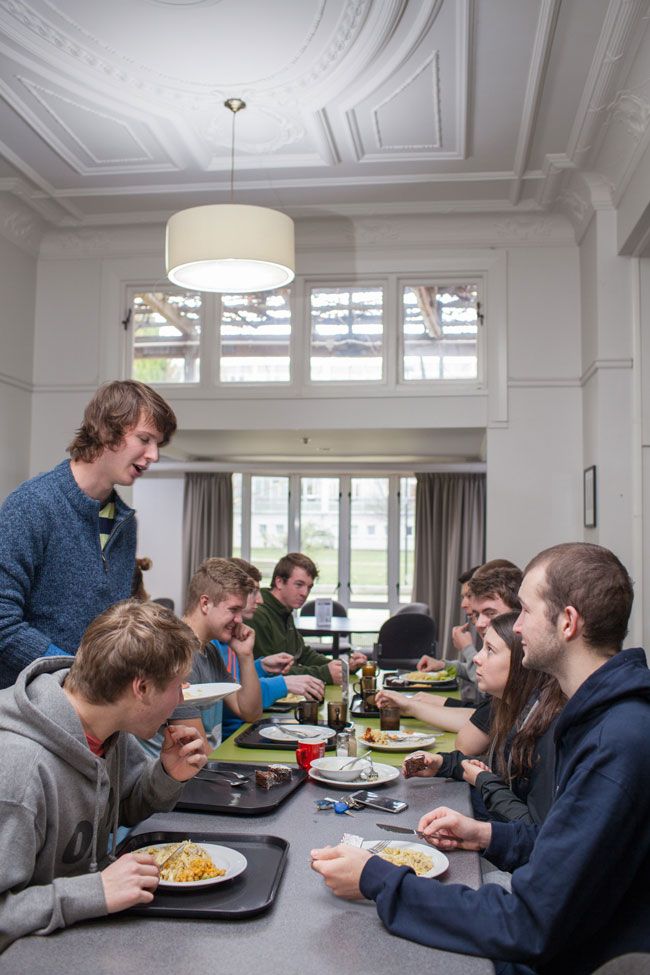
For Mr Bates, the college's dining hall is a favourite place within the college. No surprise, it seems popular with students as well.
Q. If your college was a person, how would you describe it?
A. She would have a big smile on her face, be an all-rounder who excels academically but also has interests in cultural or sporting pursuits. She would have good banter and have a big heart which cares for the community. (I've used 'she' as 2/3 of our residents are female, but our blokes are good value too!)
Q. What would you say makes your college unique? What sets it apart from others at Otago?
A. All of the colleges are great communities, and Cumberland is just one example of 15 unique residential communities. Possibly the best way to sum up Cumberland would be 'young and old' – the building was previously a nurses' home built 100 years ago, so there is history in the setup and it is a character college. However, it is only 27 years old as a University residential college and it is a vibrant and youthful college. One of our mottos is “A Community with Heart and Soul” which sums up the Cumberland philosophy.
Another word/acronym which we use is the Māori term AWHI which has connotations of embracing, supporting and we seek to build a community which embraces and supports students in their first year away from home. The 'A' stands for academic, the 'W' for well-being, the 'H' for home and the 'I' for identity – four pillars of our ethos here at Cumberland.
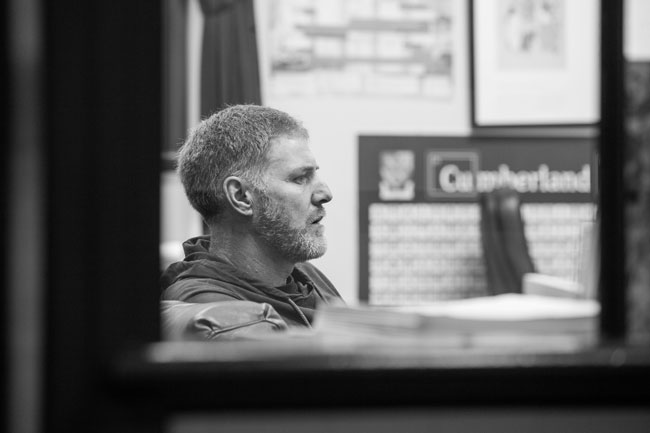
At almost anytime and anywhere in the college, Mr Bates can often be found deeply immersed in his pastoral care responsibilities.
Q. Describe a typical day for yourself around the college.
A. Days are generally a-typical, but a day may involve a start at the office around 8.15, catch up with staff regarding any issues the prior evening, operations work, planning for events on during the week ahead. Plenty of conversations with residents – academic or pastoral, as well as with staff. Some strategic thinking time. Health and Safety reflection. Maybe lunch with a visitor, and a staff meeting. Some Divisional work which needs attention, preparation for an Advisory Council meeting. Spend time with an RA who has an issue with a resident, maybe refer a student to Student Health for a medical or other issue. Have time with a resident who has a great idea, or is missing home, or has just heard some bad news. Spend some time organising a key college event with staff and RAs. Maybe a run in early evening, catch up with any staff around dinnertime, then head home. In the evenings there will likely be an event to touch base with, or something to tidy off for the day. The reality of life in a residential community is that it is the interactions with residents which make it a lively role.
Q. Is there a particularly memorable story/highlight from your time at the college that you can share with parents/whanau?
A. The finals weekend of the intercollege sporting competition this year was a special time. We had three Cumberland teams in finals: netball, volleyball and football. The three finals were intense, and although our netball girls went down to Unicol in the final, the fact that they went to extra time made for real drama. Our footballers also lost to Carrington College 4-3 in a dramatic game, so by Sunday evening's volleyball final, the players and supporters were keen to notch at least one title. The volleyballers did the trick, beating Salmond College in an entertaining final. This sporting and cultural competition has a great fit with Cumberland residents and the balanced lifestyle we promote – study hard, but enjoy life and get physical!
Oh, and the time I came on to play for our Cumby Heavies rugby team in 2014, spent 10 minutes on the field and got my nose re-broken and a small tear to the rotator cuff reminded me that my rugby playing days are probably nearly over.
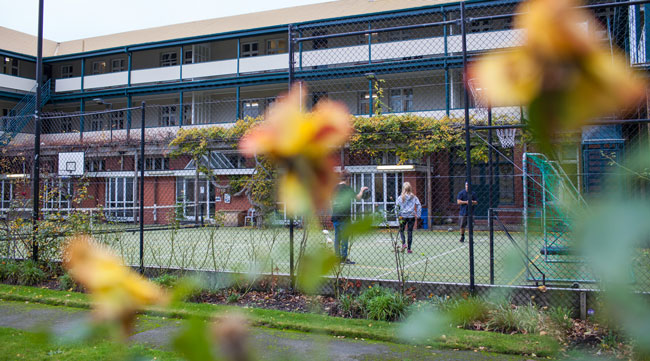
The tennis court is conveniently located at the heart of Cumberland.
Q. What do you hope the students will get out of their time at your college?
A. Of course attaining an academic qualification is the focus for anyone coming to University. But college life is about something much broader, it's about the 'university of life' in my view. My hope is that students will make friends living in community in a way they may never do again in their lives, contribute by volunteering, try new activities, play a sport or a musical instrument or sing, have fun, ask big questions about life, hopefully having a few good debates along the way. I think we need to encourage residents to take the opportunity to challenge the status quo in their lives and make the most of the stimulating environment they live in, a true university city.
Q. What would parents/whanau be surprised to learn about your college? About your role as head of college?
A. They might be surprised at the level of pastoral care on offer and the way we support students. We are not a hostel, or a hall – we are a residential college community with high level pastoral care and support for residents. We help residents get help when they are sick, we help communicate with their lecturers if they are having problems, we make sure they get the right food if they are unwell, and we let them cry with us when there is a crisis. The staff teams at all the residential colleges are all highly skilled and the University knows the residential collegiate campus is a winner.
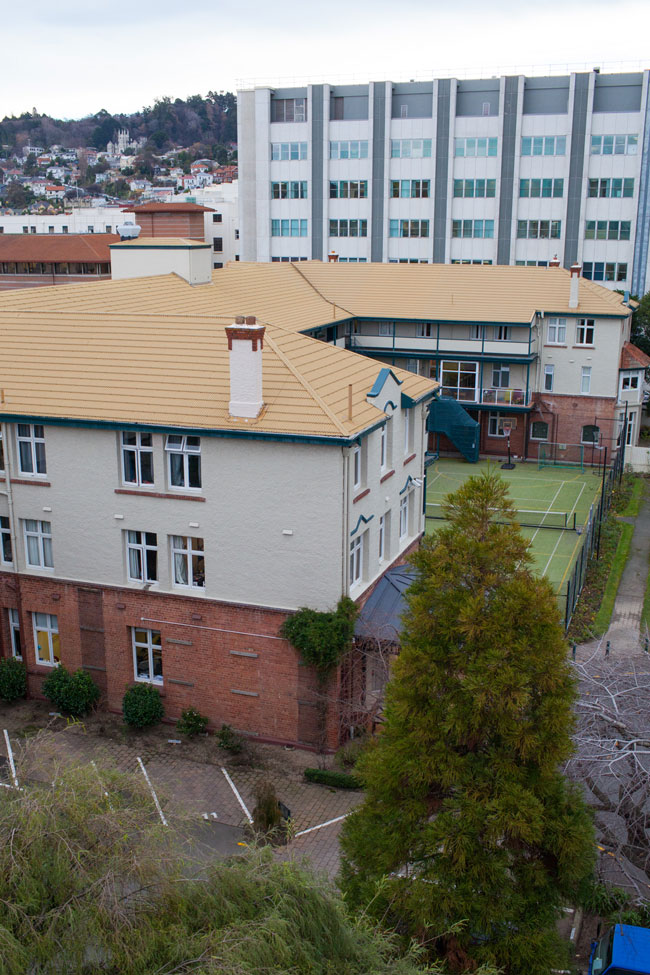
Mr Bates and his family live on-site in an apartment overlooking the college's tennis court.
Q. Do you have anything you wish to add?
A. Living in a College is a unique experience. In my particular case, my wife Rachel, and our four children, live in an apartment on one side of the building. We are surrounded by students and life is living in community by default. Getting away to refresh is important, and the quieter times of the year bring a respite, but the general vibe of College living is exciting and interesting. If you didn't like that, you would be out of here in a flash. Mostly, I enjoy it and I find myself continually learning new things, both about young people and how I respond in what can be stressful situations.
View more photos from our recent visit to Cumberland College:
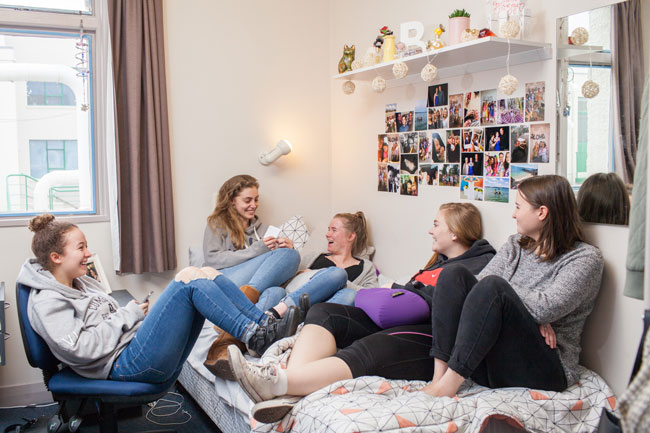
At Cumberland, rooms are allocated by course. This means students' immediate living area has people all doing the same course but social programmes allow students to meet lots of people doing different courses.
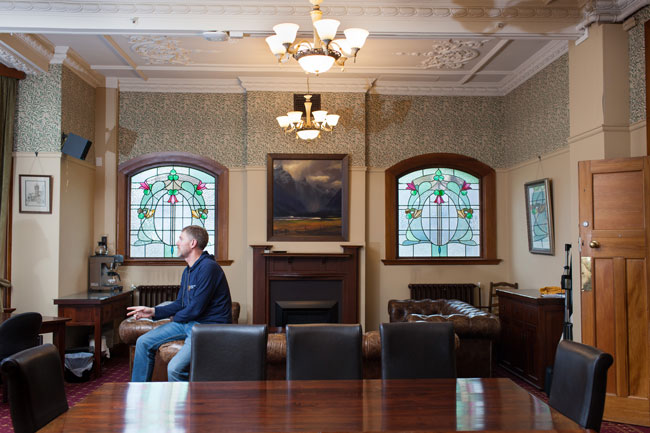
Mr Bates shows off the Green Room which functions as the college's formal common room. With its leather couches and gas fire opening out onto a beautiful private courtyard it's the perfect spot to sit and read the paper, a book, chat to some friends or have a group meeting.
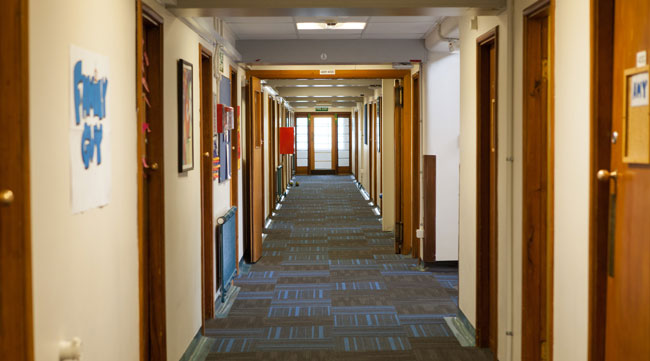
Each floor of the college and the room doors on those floors are decorated along the lines of the year's chosen theme – this year, it's TV shows.

Cumberland residents have the advantage of close proximity to the main campus allowing them to make their way back to the college for lunch most days.
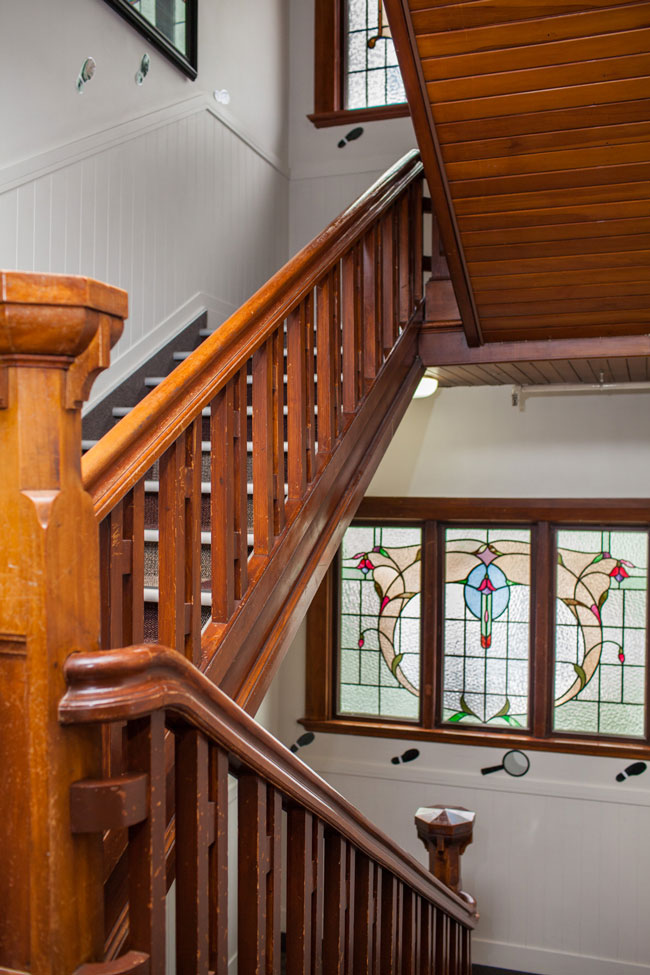
The main building was constructed in 1916. Some of the original architectural features remain. Hard to believe the building was ear-marked for demolition at the time the University took it over in 1989.
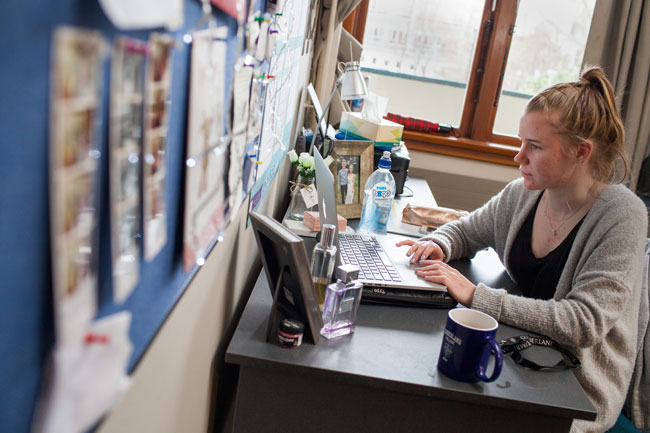
A typical Cumberland room – warm, cosy and perfect for getting down to the business of University.
Find out more about Cumberland College:
Cumberland College is one of the University of Otago's “Character Colleges”. Its central location makes it ideally suited for quick and easy access to all educational, sporting and recreational facilities. Formerly the Dunedin Hospital's Nurses' Home, Cumberland College opened its doors to students in 1989. Today, Cumberland caters to 325 residents, 95 per cent of whom are first-year students.
Address 250 Castle Street, Dunedin
Tel 64 3 479 5570
Email cumberland@otago.ac.nz
Web www.cumberland.ac.nz